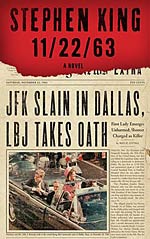
![]() Scott Laz
Scott Laz
7/9/2012
![]()
11/22/63 combines an odd mix of story elements—alternate history, historical fiction, suspense thriller, horror, romance—in a way that mostly works, since Stephen King knows his craft, and because it is tied together by way of the first-person narration. Jake Epping, high-school English teacher turned time-travelling crusader attempting to right the wrongs of the past in order to fix the present, is the lens through which we are asked to suspend our disbelief. At the same time, the plethora of story elements, combined with the obsessive attention to detail, sometimes seems like too much, and I found myself wishing for a shorter, tighter, faster-moving story.
Encouraged by restaurant owner Al Templeton, who has discovered a “time bubble” leading to 1958 in his storeroom, Epping takes on the mission of preventing Lee Harvey Oswald from assassinating President Kennedy. Templeton tried to do this himself, but ultimately failed, and had to return to the present. (No matter how long he remains in the past, the time portal always returns the time traveler to the time he left, and every subsequent return to 1958 causes a “reset,” erasing any changes made during the last trip.) It turns out that this failure was due to the fact that “the past” doesn’t want to be changed, and so throws up obstacles against anyone trying to do so. These obstacles may include the actions of other people and natural phenomena. King does make an attempt to explain why the fabric of reality resists being changed, or how “the past” can have agency, but this aspect of the novel was the most unsatisfactory to me, and science fiction readers familiar with time travel tropes and paradoxes will have some trouble here. The “rules” of time travel that are set up seem designed to drive the plot and create dilemmas for the main character, and I found myself questioning them in a way that sometimes distracted me from the story.
In any case, the fact that “the past is obdurate” (as Epping repeats a couple of hundred times in the course of the novel) is the source of much of the drama. Also a characteristic of time travel, apparently, is the encountering of all kinds of odd coincidences (“the past harmonizes,” is also repeated like a mantra throughout the book). Why? Why not. I suppose it gave King a way to add resonance to the story and emphasize the idea that “the past” is somehow being affected in strange ways by the presence of someone who is not supposed to be there.
The heart of the novel is really the romance story. In order to accomplish his plan to stop Oswald, Epping has to remain in the past for several years before returning (after which, if he has succeeded, he can never go back, since that would trigger another “reset.”). While there, he works as a teacher, and falls in love, forcing him to face the dilemma of how he can proceed with his plan while still holding onto the woman he loves. Should he reveal his secret to her? Can he stop Oswald and remain in the past? Take her with him back to the present? I won’t spoil it, but it does seem that love connects people across timelines and years of history.
Finally, the novel is overlong. Based on other reviews, it seems that the accumulation of detail is attractive to many readers, creating an immersive experience. While I can understand that, and see it working much of the time, it’s overdone at other times. The past is convincingly evoked, but it sometimes seems overdone and repetitive. In addition, the main plot described above is not really begun until about a third of the way through, as Epping (who does, after all, have nearly five years to kill before the Kennedy assassination attempt), makes a couple of trial runs to the past, and tries to prevent a murder and an accident, both of which he knows about from his 2011 perspective. The main thrust of the book is the attempt to stop Oswald, with the love story adding interest and potential danger to Epping’s encounter with the past. But along the way we also get the three-hundred page warm-up, loving descriptions of classic cars and root beer floats (and many, many more aspects of the late ‘50s and early ‘60s), domestic drams, and high school musicals. Describing it, I have a hard time believing it works as well as it does, and I think SF readers will be more annoyed with some of these aspects than readers who aren’t already familiar with time travel and alternate history stories, but overall it works pretty well. But some judicious shortening might have paid big dividends.